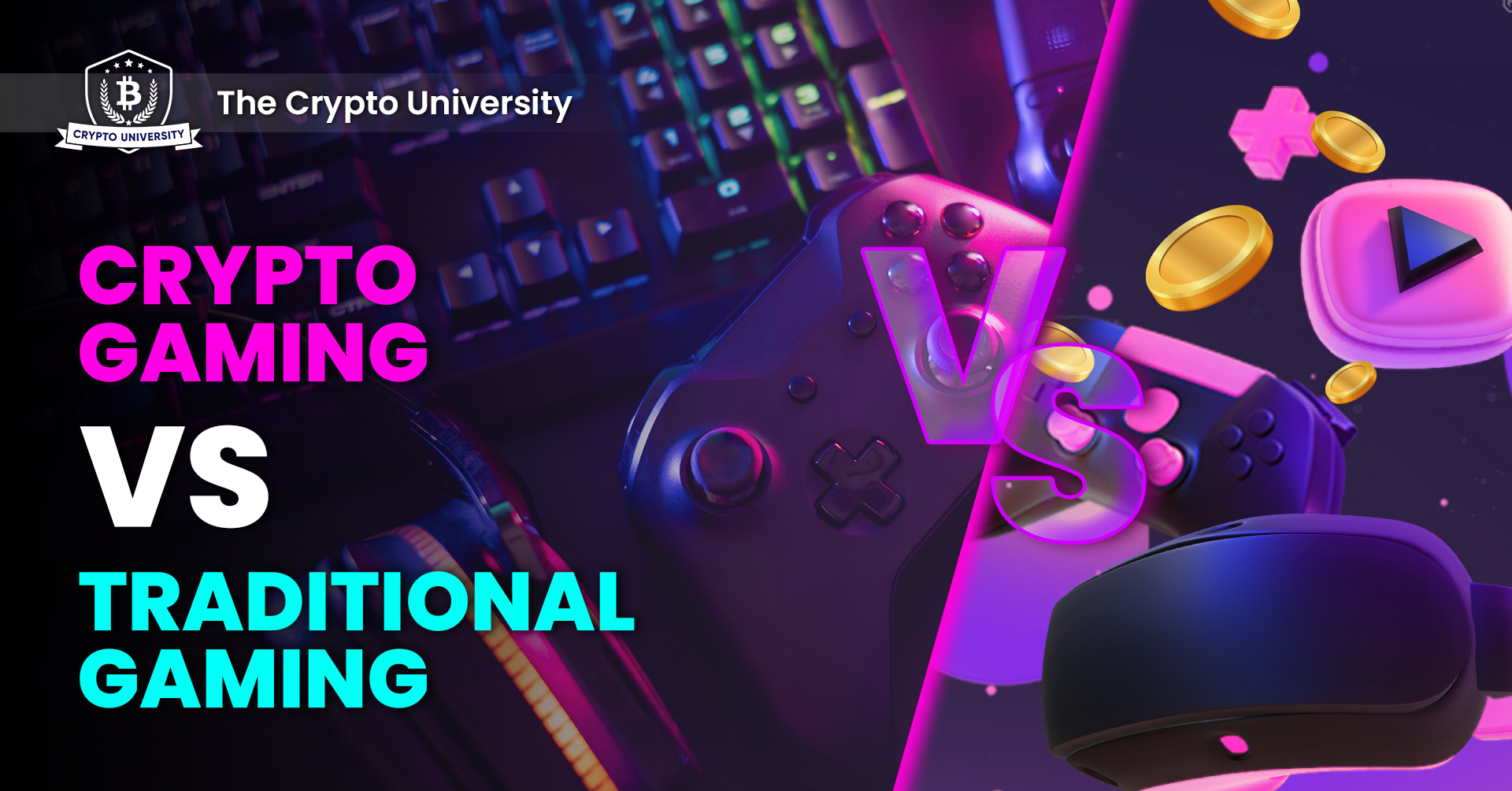The gaming industry is one of the most rapidly growing industries in the world, and the rise of crypto gaming is only adding to its momentum. Crypto gaming is a new type of gaming that uses blockchain technology to create a more decentralized and transparent gaming experience. In this blog post, we will explore the differences between traditional gaming and crypto gaming to help you have a better understanding of the unique benefits of each of them.
The Key Differences Between Traditional Gaming and Crypto Gaming
In this section, we’ll explore the key differences between traditional games and crypto games, highlighting their key differences and shedding light on the unique aspects offered by crypto games. Here are some of them;
Ownership of in-game assets:
In traditional gaming, you enjoy the gameplay and progress within predefined rules, but the ownership of in-game assets remains with the game developer or publisher. On the other hand, crypto games leverage blockchain technology, enabling players to truly own their in-game assets as non-fungible tokens (NFTs). This ownership empowers players with greater control and the ability to trade or sell their valuable digital assets on decentralized marketplaces.
Transparency and Provably Fair Gameplay:
Transparency is a fundamental principle of blockchain technology, and crypto games capitalize on this feature. Traditional games may suffer from a lack of transparency in terms of random number generation, item rarity, or the integrity of in-game systems. However, crypto games employ smart contracts and decentralized consensus mechanisms, ensuring provably fair gameplay. Every action and transaction taking place within the game is recorded on the blockchain, offering players a transparent and auditable gaming experience.
Community Engagement and Governance:
Crypto games thrive on community participation and governance. Decentralized autonomous organizations (DAOs) and community-driven decision-making processes empower players to have a say in the development and direction of the game. This aspect fosters a strong sense of community ownership and engagement, where players become active contributors rather than passive consumers. Traditional games, on the other hand, rely primarily on bureaucratic decision-making structures.
Interoperability and Cross-Game Utility:
One of the remarkable features of crypto gaming is the interoperability and cross-game utility enabled by blockchain technology. In traditional gaming, each game operates in isolation, and the assets obtained in one game are usually restricted to that specific game’s ecosystem. On the other hand, crypto games allow for seamless interoperability, enabling players to utilize their assets across multiple games and platforms. This interoperability expands the possibilities for gameplay, asset utilization, and player engagement.
Global Accessibility:
Crypto games embrace a global audience, unbound by geographic limitations. Players from anywhere in the world can participate, trade, and interact in these decentralized ecosystems. Traditional games, while often accessible to players worldwide, may face regional restrictions or language barriers that can limit their reach
Decentralization
Traditional games are centralized, meaning that they are run and controlled by a central authority or game developer. This central authority has complete control over the game, its rules, and the assets within it. In contrast, crypto games are decentralized. This means that they are run on a distributed network and are not controlled by a central authority. Hence, players have more control over the game, its rules, and the assets within it.
Security:
Security and Fraud Prevention:
Blockchain technology provides enhanced security features that protect players from fraud, hacking, and unauthorized modifications. Traditional games, on the other hand, are susceptible to various security risks due to their centralized nature, making players vulnerable to scams and data breaches.
What are the similarities between Traditional gaming and Crypto gaming?
Despite their inherent differences, traditional games and crypto games do share certain similarities that support the broader concept of gaming. Here are some of the Similarities between them.
Competitive Nature
Both traditional games and crypto games thrive on competition, promoting players’ desire to win, achieve goals, and surpass their opponents. Whether it’s a classic board game or a decentralized blockchain game, the fundamental drive to succeed and outperform others remains constant in both types of games.
Entertainment Value
Both traditional games and crypto games are designed to entertain and engage players. Regardless of the format, the primary objective is to provide an enjoyable experience.
Community Building
Traditional and crypto games foster communities of players who share common interests. Whether it’s a physical gaming group or an online community, players come together to discuss strategies, share experiences, and form connections.
Expanding Universes
Both types of games can create vast and immersive worlds for players to explore. Traditional games may have expansive game maps, while crypto games often feature decentralized virtual worlds.
Will crypto games eliminate Traditional games in the future?
It is important to note that crypto games are still in their early stages of development. While they have garnered attention and boast of dedicated communities, they have yet to achieve mainstream adoption comparable to traditional games. Additionally, the technical complexities of blockchain technology may act as a barrier for some potential players.
Hence, while crypto games offer exciting prospects and innovative features, it is unlikely that they will replace traditional games entirely. Both crypto games and traditional games possess their own unique strengths and cater to different audiences. It is more probable that these two forms of gaming will coexist, each appealing to distinct player preferences. As the crypto gaming industry continues to evolve, it will undoubtedly carve out its own niche, while traditional games remain an integral part of the gaming space.
Conclusion
Crypto gaming has ushered in a new era of possibilities and excitement for gamers worldwide. While traditional gaming has its merits, crypto gaming offers unparalleled advantages such as true ownership of in-game assets, decentralized economies, and enhanced security. The integration of cryptocurrencies and blockchain in gaming not only fosters innovation but also empowers players by granting them control over their digital possessions. As the crypto gaming landscape continues to evolve, it is evident that this innovative fusion of technology and entertainment is here to stay.
Want to take your gaming experience to new heights? Check out Bitcasino and Sportsbet.io – the ultimate crypto gaming platforms.





